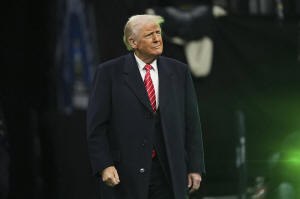Law firm targeted by Trump could have been 'destroyed,' chairman says in
explaining deal with Trump
[March 24, 2025]
By ERIC TUCKER
WASHINGTON (AP) — The chairman of a prominent law firm who cut a deal
with President Donald Trump last week to avert the consequences of a
White House executive order told colleagues in an email Sunday that he
did so because the order “could easily have destroyed our firm” and put
it out of business.
The message from Brad Karp offers the most detailed public explanation
yet about the decision to make significant concessions to the White
House in the face of an executive order that targeted his firm, Paul,
Weiss, Rifkind, Garrison & Wharton.
The order, the latest in a series of similar actions targeting law firms
whose lawyers have performed legal work that Trump disagrees with,
threatened the suspension of security clearances for Paul Weiss
attorneys as well as the termination of any federal contracts involving
the firm. It cited as an explanation the fact that a former Paul Weiss
attorney, Mark Pomerantz, had been a central player in an investigation
by the Manhattan district attorney’s office into Trump’s finances before
Trump became president.
On Thursday evening, though, Trump announced that he had rescinded the
March 14 order following a White House meeting with Karp. The White
House said the firm had agreed to dedicate $40 million worth of free
legal services to support certain Trump administration agenda items,
including on countering antisemitism; to conduct an audit of its hiring
practices and “not adopt, use, or pursue any DEI" policies; and to take
on clients regardless of political affiliation.

The resolution triggered an intense backlash within the legal community,
with lawyers criticizing the firm for capitulating to Trump rather than
standing up to him, particularly at a time when he's using the power of
the presidency to threaten the livelihoods of attorneys and companies he
believes have crossed him. The deal also reinforced Trump's recent
success in extracting concessions from a broad swath of targets, in both
academia and private industry, who have opted to compromise rather than
fight.
In an email to Paul Weiss employees obtained by The Associated Press,
Karp described the order as having presented an “existential crisis” for
the firm. He said it was very likely the firm would not have survived a
protracted fight with the Trump administration.
“The executive order could easily have destroyed our firm,” Karp wrote.
“It brought the full weight of the government down on our firm, our
people, and our clients. In particular, it threatened our clients with
the loss of their government contracts, and the loss of access to the
government, if they continued to use the firm as their lawyers. And in
an obvious effort to target all of you as well as the firm, it raised
the specter that the government would not hire our employees.”

[to top of second column]
|

President Donald Trump attends the finals at the NCAA wrestling
championship, Saturday, March 22, 2025, in Philadelphia. (AP
Photo/Matt Rourke)

Karp wrote that the firm was initially prepared to challenge the
executive order in court, something another law firm targeted with a
Trump executive order, Perkins Coie, has done. Even as a team of
attorneys prepared a complaint, he said, “it became clear that, even
if we were successful in initially enjoining the executive order in
litigation, it would not solve the fundamental problem, which was
that clients perceived our firm as being persona non grata with the
Administration.”
He also said that the support he hoped the firm would receive from
other law firms never materialized.
“Disappointingly, far from support, we learned that certain other
firms were seeking to exploit our vulnerabilities by aggressively
soliciting our clients and recruiting our attorneys,” he wrote.
Against that backdrop, when the firm learned that the administration
might be willing to cut a deal, it sought to do so and negotiated a
settlement in a “matter of days.”
“I know many of you are uncomfortable that we entered into any sort
of resolution at all. That is completely understandable,” Karp wrote
to his colleagues, adding that “there was no right answer to the
predicament in which we found ourselves.”
He added: “It is very easy for commentators to judge our actions
from the sidelines. But no one in the wider world can appreciate how
stressful it is to confront an executive order like this until one
is directed at you."
The firm is one of numerous Trump targets that have recently reached
agreements with the administration rather than further provoke the
president's ire.

On Friday, for instance, Columbia University agreed to put its
Middle East studies department under new supervision and overhaul
its rules for protests and student discipline, acquiescing to an
ultimatum by the Trump administration to implement those changes or
risk losing billions of dollars in federal funding.
Meta and ABC made settlement payments to Trump’s future presidential
library to end lawsuits filed by Trump. Other tech and financial
firms have publicly rolled back DEI programs in line with Trump’s
policy interests.
____
Associated Press writer Zeke Miller in Washington contributed to
this report.
All contents © copyright 2025 Associated Press. All rights reserved |